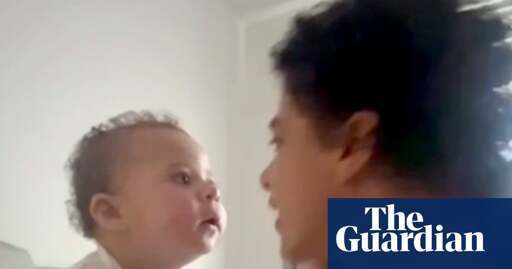- cross-posted to:
- andfinally@feddit.uk
- liverpool@feddit.uk
- cross-posted to:
- andfinally@feddit.uk
- liverpool@feddit.uk
cross-posted from: https://feddit.uk/post/14265279
The upward intonation, the guttural “ck” and even the cheeky comeback to win the argument: at just 19 months old, baby Orla has mastered the crucial elements of speaking like a scouser.
Impressively, the toddler who featured in a viral video this week appears to have done so without the need for actual words.
A clip posted on TikTok, and now viewed more than 20m times, shows Orla babbling in a Liverpudlian accent as her babysitter, Olayka, tries and fails to coax her into taking a nap. Scientists say that the cute exchange is also a vivid illustration of the processes by which babies acquire language – and the surprising role of accents.
Babies are so tuned in to the musical ups and downs of speech that even as newborns they cry in distinctive ways that reflect the languages that they have heard while in the womb.
In one 2009 study, Prof Kathleen Wermke, a pioneer in the field of speech development at the Würzburg University in Germany, found that French infants tend to wail on a rising note and German babies favour a falling melody and other patterns have been seen for Mandarin, Swedish and African languages. “When I started 40 years ago, if I told people I was recording babies crying and making high-pitched sounds they’d look at you and think ‘Is this really science?’,” she said.
Research on language acquisition is often genuinely cute.
I have some related anecdote on this. When my nephew was learning to talk (back then he was, like, 1~2yo? He’s now 16), I recorded and transcribed some things that he said. Here’s a few of them:
Orthographic Adult pronunciation His pronunciation Gloss chocolate [ʃo.ko.'lä.te] [ku.'wä.te] chocolate vovó [vo.'vɔ] [bu.'bɔ] grandma Amon [ä’mõ] [mu’mõ] my cat’s name dodói [do.'dɔɪ̯] [du.'dɔɪ̯] boo-boo, hurtsie mexerica [mi.ʃi.'ɾi.kɐ] [mi.'ji.kä] mandarin orange Look at the pattern - pre-stressed vowels get raised. The reason why my nephew was doing this in Portuguese is basically the same as why Orla (from the text) is using [χ] (the “guttural ck”) in her English, because even as the child is learning to talk, they’re already picking up features from the local variety. And that pattern where the vowels get closed before the stress is common place for Sulista Portuguese speakers (check how “mexerica” is pronounced, with [i] instead of [e]), just like Scouse English conditionally renders coda /k/ as [ç x χ].
Thanks for sharing this. It’s really interesting.
Very minor (possible?) correction. I think the English word you want for “dodoi” might be “boo-boo”. “boo-hoo” is a representation of crying. Usually used sarcastically. (“Oh, you didn’t like that? Boo-hoo. Get over it.”) Whereas “a boo-boo” is a childish term for a minor injury.
Out of interest, is Amon a common/fairly normal Portuguese pet name, or did you name him after the Avatar character? (Or something else?)
Fixed it - thanks! “Dodói” (I also forgot the diacritic) is boo-boo, indeed - a childish way to call small injuries.
Amon isn’t a common pet name here. The one naming him was my mum, who loves Old Egyptian culture; to give you an idea, my childhood cat was Cleópatra, and even one of my current cats (Kika) was supposed to be called Ísis. (The one naming Kika was my nephew - by then he already understood how this “naming” thing works.)
This is the best summary I could come up with:
The upward intonation, the guttural “ck” and even the cheeky comeback to win the argument: at just 19 months old, baby Orla has mastered the crucial elements of speaking like a scouser.
A clip posted on TikTok, and now viewed more than 20m times, shows Orla babbling in a Liverpudlian accent as her babysitter, Olayka, tries and fails to coax her into taking a nap.
Babies are so tuned in to the musical ups and downs of speech that even as newborns they cry in distinctive ways that reflect the languages that they have heard while in the womb.
In one 2009 study, Prof Kathleen Wermke, a pioneer in the field of speech development at the Würzburg University in Germany, found that French infants tend to wail on a rising note and German babies favour a falling melody and other patterns have been seen for Mandarin, Swedish and African languages.
The advent of machine learning has allowed researchers to analyse huge datasets of home-recorded infant and toddler sounds and this shows, as many parents would recognise, that babies don’t all acquire language in the same way.
“The effect is so strong that we can bring a mum or dad into the lab and the parents that say the most words, their babies’ vocabulary grows at a faster rate and that benefit lasts years into the future.”
The original article contains 823 words, the summary contains 226 words. Saved 73%. I’m a bot and I’m open source!





